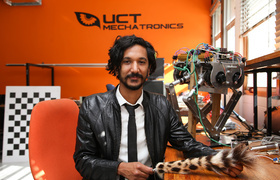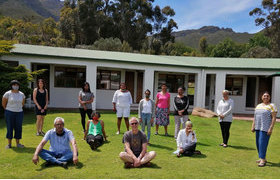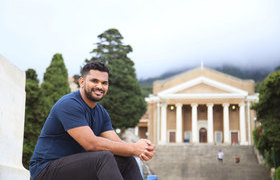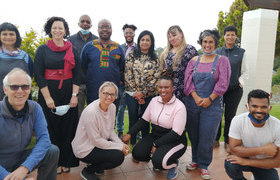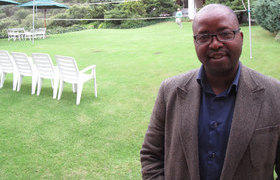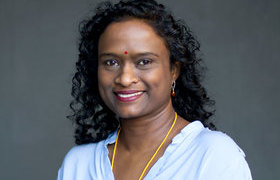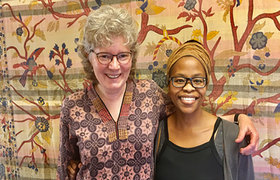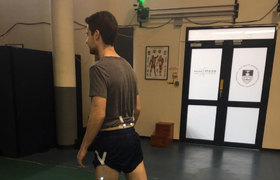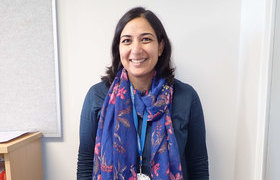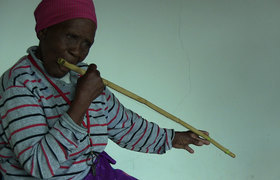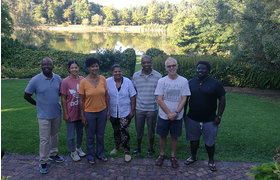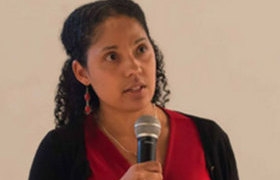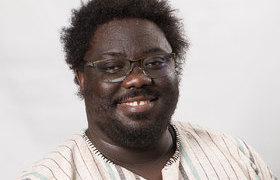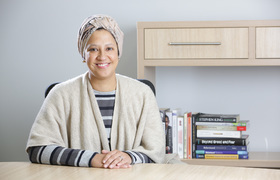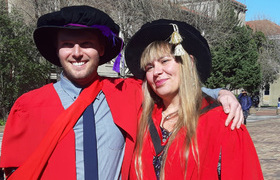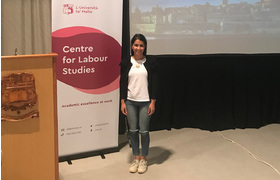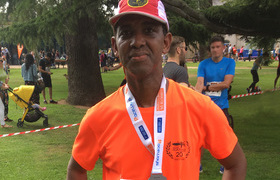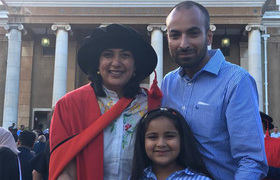Put yourself out there, urges Mbatani
04 July 2018 | Story Kate-Lyn Moore. Photo Robyn Walker. Read time 6 min.
Don’t be afraid of putting yourself out there and facing the unknown, says senior lecturer Dr Nomonde Mbatani – a new recruit to the Next Generation Professoriate (NGP) programme.
The initiative was launched in 2015 and forms part of the university’s efforts to transform its academic profile, with a particular focus on black and women staff. Under the guidance of Dr Robert Morrell, the NGP provides support and development opportunities to mid-career academics such as Mbatani.
“I just thought: ‘If the opportunity is there, let me go for it,’ ” she says. “At my age, I have made up my mind that whatever I do, I do it for myself … I do things as part of learning. I do it for the experience. Where it takes me would be another thing.”
“I have achieved so much. It may not mean much to somebody else, but to me it’s quite a lot.”
For Mbatani, the move into the NGP is less about acquiring a higher academic title, and more about remaining open to opportunities for growth.
“Whether I am called senior lecturer or professor, it doesn’t matter that much. But I would love to get the experience for self-development.”
As a senior lecturer in obstetrics and gynaecology at UCT’s faculty of health sciences and Groote Schuur Hospital, Mbatani is incredibly proud of what she has accomplished in her life.
“I have achieved so much. It may not mean much to somebody else, but to me it’s quite a lot … When I think about people that I grew up with, where I grew up, and everything else … wow, I’ve done well.”
Mbatani’s main interest in the NGP programme is in improving her academic writing and publishing track record.
“You have the data. But how do you put that into words? There’s no one to teach you.”
“You are a young girl who wants to enter the clinical field because you want to help people, and before you know it you are working at a university where research output is expected. You are working in the hospital throughout the time.
“You’ve got all of the information. You’ve got the patients. You have the data. But how do you put that into words? There’s no one to teach you.”
Mbatani hopes that through her involvement in the NGP programme she will be able to pass academic writing and research skills on to her students.
Driven to help people
Mbatani’s journey began in Port Elizabeth. As a young woman driven to make a positive difference in the lives of others, she trained in nursing and midwifery.
In 1988 she began studying to be a doctor, later taking up a post as a medical officer at Dora Nginza Hospital.
During this time she began teaching students and nurses, which she found incredibly rewarding.
“I can teach a nurse because I know what they know, what they can know, and what they don’t need to know … I can easily say to a nurse ‘I understand’, because I have been a nurse before. For some of them, it comes as a surprise.”
“I really like it when I come and I meet with my patients, and we laugh, and I hear their stories.”
Mbatani is now a specialist in gynaecological oncology. But it wasn’t her idea to shift into the sub-speciality, she recalls.
“While I was working as a medical officer, I met with a Dr Goosen, an 80-something-year-old man who I worked with in maternity. And he used to say: ‘I’m going to make a gynaecologist out of you.’ So, it’s by default that I’m here.
“I think after he died, two of us – my colleague Dr Steve Jeffery, as well – thought, ‘Let’s just honour him and do this.’”
Love what you do
Despite this unorthodox start, and the ongoing challenge of balancing her clinical, academic and teaching duties, Mbatani loves her work.
“Just getting a balance and doing what I like in life is what’s most important. That’s what matters to me.
“I really like it when I come and I meet with my patients, and we laugh, and I hear their stories.”
But Mbatani is also an enthusiastic researcher, and her interest in the prevention of endometrial and cervical cancer blossomed soon after she began working at Groote Schuur Hospital.
Mbatani is currently involved in a study in the Northern Cape, focused on women patients with a predisposition to both cancer of the colon and of the uterus.
“It is an ongoing study, and will probably take five to 10 years before we are able to comment … It’s a low-rush type of cancer.”
Another project, conducted with Dr Hue-Tsi “Tony” Wu, assesses various risk factors and biomarkers in relation to endometrial cancer.
Ever curious, Mbatani relishes the excitement of discovery and of facing the unknown in her work.
“[This] is one of the nice things about the type of work I do, especially with cancer patients. You don’t know what you’re going to find inside. So, everything is exciting.”
 This work is licensed under a Creative Commons Attribution-NoDerivatives 4.0 International License.
This work is licensed under a Creative Commons Attribution-NoDerivatives 4.0 International License.
Please view the republishing articles page for more information.
Next Generation Professoriate (NGP)
The Next Generation Professoriate (NGP) is a mid-career academic staff development and support programme. Funded by the vice-chancellor’s Strategic Funds, the NGP addresses demographic inequalities in the academic hierarchy. The goal is to help members become associate and full professors.
The NGP was officially launched in September 2015. By the end of 2018, four of its members had been promoted to full professor and a further 14 had reached the rank of associate professor.
The programme is led by Dr Robert Morrell, who has over 35 years of academic experience in South African universities. He has a B1-rating from the the National Research Foundation (NRF) and is an elected member of the Academy of Sciences in South Africa.
Newsletters
In the news
